A Quote by Immanuel Kant
Prudence reproaches; conscience accuses.
Quote Topics
Related Quotes
The step between prudence and paranoia is short and steep. Prudence wears a seat belt. Paranoia avoids cars. Prudence washes with soap. Paranoia avoids human contact. Prudence saves for old age. Paranoia hoards even trash. Prudence prepares and plans, paranoia panics. Prudence calculates the risk and takes the plunge. Paranoia never enters the water.
An older child, one who possesses a conscience, will be troubled with self-reproaches and feelings of shame for his naughtiness, even if he is not discovered. But our two-year-olds and our three-year- olds experience guilt feelings only when they feel or anticipate disapproval from the outside. In doing this, they have taken the first steps toward the goal of conscience, but there is a long way ahead before the policeman outside becomes the policeman inside.
Does a man reproach thee for being proud or ill-natured, envious or conceited, ignorant or detracting? Consider with thyself whether his reproaches are true. If they are not, consider that thou art not the person whom he reproaches, but that he reviles an imaginary being, and perhaps loves what thou really art, though he hates what thou appearest to be.
[Prudence] is the virtue of that part of the intellect [the calculative] to which it belongs; and . . . our choice of actions will not be right without Prudence any more than without Moral Virtue, since, while Moral Virtue enables us to achieve the end, Prudence makes us adopt the right means to the end.







































